
President Donald J. Trump’s response to police violence and peaceful protests undermines governmental legitimacy.
Donald Trump’s approach to presidential power looks a lot like Derek Chauvin’s approach to policing.
Former Minneapolis police officer Chauvin knelt for nearly nine minutes on the neck of George Floyd, an unarmed Black man, until Floyd was dead. President Trump, meanwhile, has urged governors to “dominate” protesters in cities across the country, while his Administration has deployed tear gas and physical force against peaceful protestors in Washington, D.C. President Trump has threatened to deploy U.S. military forces around the country to “quickly solve the problem.”
But kneeling on America’s metaphorical neck will not solve anything. The way to build and maintain order in society is to build and maintain the government’s legitimacy.
People obey the law when they see the legal system as legitimate. They are willing to modify their behavior—even to sacrifice their own interests for the good of others—when they see that doing so is reasonable and fair. And the system is fair when everyone in society is held to the same standards—and when police officers treat all people with dignity and respect.
An extensive body of social science research supports the conclusion that legitimacy undergirds societal order. Sadly, it is a conclusion that seems lost on President Trump and on too many police officials around the country.
This lack of legitimacy is exactly why protests are sweeping across the nation. The horrific killing of George Floyd, following the police killings of Breonna Taylor, Tony McDade, Eric Garner, Michael Brown, Tamir Rice, and so many other unarmed Black people, has again made evident a moral ugliness festering throughout the U.S. legal system. Adding to these injustices are the disproportionate COVID-19 fatality rates and economic struggles experienced by Black Americans, Native Americans, and other minorities.
To enhance “law and order”—President Trump’s stated goal—Presidents must bolster the government’s legitimacy, not brandish its capacity for violence.
Political scientist Richard Neustadt has famously explained that real presidential power is ultimately the power to persuade. That power can be used to inspire, heal, and motivate. This is a vastly different kind of power than the stuff of President Trump’s rhetoric. But a persuasive, unifying kind of presidential power is exactly what the United States needs to promote a more empathic, even-handed use of official force and to restore government’s legitimacy.
Coercion is simply infeasible on its own to sustain order in a country as vast and highly populated as the United States. Moreover, unjust coercion only backfires. After National Guard soldiers shot 13 college students at Kent State University fifty years ago, killing four of them, the incident only emboldened student protestors across the country and deflated public confidence in governmental authority.
The nation’s military leaders surely realize that coercion would be illegitimate and counterproductive, even if President Trump does not. Notably, within 48 hours of President Trump issuing his threat, Defense Secretary Mark Esper disavowed the domestic use of military force to quell protests. Former Defense Secretary James Mattis, who served for two years in the Trump Administration, broke his silence to decry President Trump’s threats as antithetical to American values.
Instead of threats, the nation needs more listening and more responsive action. It needs sweeping reforms to policing bureaucracies: greater discipline and de-escalation, less acceptance of intolerance and volatility by individual officers, and serious structural changes, including changing the immunity that currently shields police officers from legal consequences for their violence.
Not only must police officers show that Black lives matter, but so must the rest of society. The nation’s gaping inequality—and its continued inability to meet basic health care, educational, and economic needs of all Americans—further undercuts America’s legitimacy.
Sadly, President Trump has done more to undermine governmental legitimacy than to strengthen it. He openly denigrates the government that he heads, calling federal law enforcement officials “human scum.” He propagates conspiracy theories of a “deep state” that works against, rather than for, the American people. And his attacks on federal judges have been so irresponsible that they have drawn public rebuke from the Chief Justice of the U.S. Supreme Court.
Far from setting an example of respect for the law, President Trump models a “me-first” mentality. He and his family have profited off his position. He and his aides have committed or condoned a litany of unlawful actions. And President Trump all too conveniently dismisses well-documented findings of such conduct as “fake news.”
What the United States needs is a President who speaks and acts to heal the nation and promote legitimacy. When President Trump threatens to dominate civilians exercising their First Amendment rights, he only weakens America. Brute force directed against peaceful protesters is, at its core, an illegitimate abuse of power—just as was the force Derek Chauvin applied to George Floyd’s neck.




